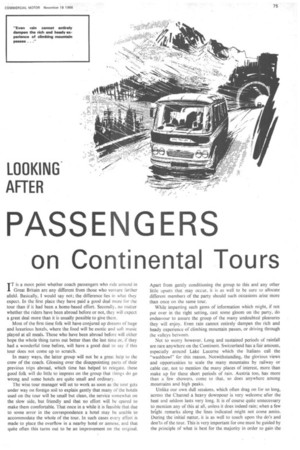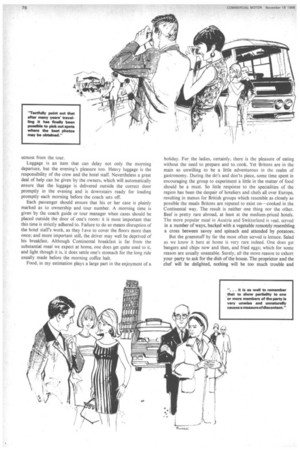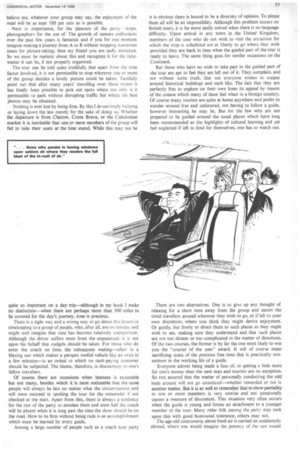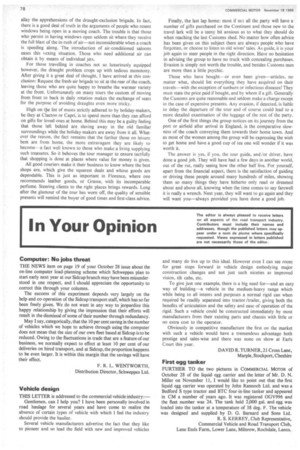LOOKING AFTER
Page 77

Page 78

Page 79

Page 80

If you've noticed an error in this article please click here to report it so we can fix it.
PASSENGERS
on Continental Tours
TT is a moot point whether coach passengers who ride around in Great Britain are any different from those who venture farther afield. Basically, I would say not; the difference lies in what they expect. In the first place they have paid a good deal more Idr the tour than if it had been a home-based effort. Secondly, no matter whether the riders have been abroad before or not, they will expect a great deal more than it is usually possible to give them.
Most of the first-time folk will have conjured up dreams of huge and luxurious hotels, where the food will be exotic and soft music played at all meals. Those who have been abroad before will either hope the whole thing turns out better than the last time or, if they had a wonderful time before, will have a good deal to say if this tour does not come up to scratch.
In many ways, the latter group will not be a great help to the crew of the coach. Glossing over the disappointing parts of their previous trips abroad, which time has helped to relegate, these good folk will do little to impress on the group that things do go wrong and some hotels are quite small and ordinary.
The wise tour manager will set to work as soon as the tour gets under way on foreign soil to explain gently that many of the hotels used on the tour will be small but clean, the service somewhat on the slow side, but friendly and that no effort will be spared to make them comfortable. That once in a while it is feasible that due to some error in the correspondence a hotel may be unable to accommodate the whole of the tour. In such cases every effort is made to place the overflow in a nearby hotel or annexe, and that quite often this -turns out to be an improvement on the original. Apart from gently conditioning the group to this and any other little upsets that may occur, it is as well to be sure to allocate different members of the party should such oecasions arise more than once on the same tour.
While imparting such gems of information which might, if not put over in the right setting, cast some gloom on the party, do endeavour to assure the group of the many undoubted pleasures they will enjoy. Even rain cannot entirely dampen the rich and heady experience of climbing mountain passes, or driving through the valleys between.
Not to worry however. Long and sustained periods of rainfall are rare anywhere on the Continent. Switzerland has a fair amount, especially around Lake Lucerne which the Italians call the "washbowl" for this reason. Notwithstanding, the glorious views and opportunities to scale the many mountains by railway or cable car, not to mention the many places of interest, more than make up for these short periods of rain. Austria too, has more than a few showers, come to that, so does anywhere among mountains and high peaks.
Unlike our own dull sessions, which often drag on for so long, across the Channel a heavy downpour is very welcome after the heat and seldom lasts very long. It is of course quite unnecessary to mention any of this at all, unless it does indeed rain; when a few bright remarks along the lines indicated might not come amiss. During the initial natter, it is as well to touch upon the do's and don'ts of the tour. This is very important For one must be guided by the principle of what is best for the majority in order to gain the
utmost from the tour.
Luggage is an item that can delay not only the morning departure, but the evening's pleasure too. Heavy luggage is the responsibility of the crew and the hotel staff. Nevertheless a great deal of help can be given by the owners, which will automatically ensure that the luggage is delivered outside the correct door promptly in the evening and is downstairs ready for loading promptly each morning before the coach sets off.
Each passenger should ensure that his or her case is plainly marked as to ownership and tour number. A morning time is given by the coach guide or tour manager when cases should be placed outside the door of one's room: it is most important that this time is strictly adhered to. Failure to do so means disruption of the hotel staff's work, as they 1ave to cover the floors more than once; and more important still, the driver may well be deprived of his breakfast. Although Continental breakfast is far from the substantial meal we expect at home, one does get quite used to it, and light though it is, it does settle one's stomach for the long ride usually made before. the morning coffee halt.
Food, in my estimation plays a large part in the enjoyment of a holiday. For, the ladies, certainly, there is the pleasure of eating without the need to prepare and to. cook. Yet Britons are in the main so unwilling to be a little adventurous in the realm of gastronomy. During the do's and don'ts piece, some time spent in encouraging the group to experiment a little in the matter of food should be a must. So little response to the specialities of the region has been the despair of hoteliers and chefs all over Europe, resulting in menus for British groups which resemble as closely as possible the meals Britons are reputed to exist on—cooked in the Continental way. The result is neither one thing nor the other. Beef is pretty rare abroad, at least at the medium-priced hotels. The more popular meal in Austria and Switzerland is veal, served in a number of ways, back,pd with a vegetable remotely resembling a cross between savoy and spinach and attended by potatoes.
But the greenstuff by far the most often served is lettuce. Salad as we know it here at home is very rare indeed. One does get bangers and chips now and then, and fried eggs; which for some reason are usually uneatable. Surely, all the more reason to exhort your party to ask for the dish of the house. The proprietor and the chef will be delighted, nothing will be too much trouble and believe me, whatever your group may say, the enjoyment of the meal will be as near 100 per cent as is possible.
Next in importance, for the pleasure of the partystops, photographers for the use of. The growth of camera enthusiasts over the past few years is fantastic and if you for one moment imagine making a journey from A to B without stopping numerous times for picture-taking; then my friend you are sadly mistaken. So we must be realistic about this and recognize it for the timewaster it can be, if not properly organized.
The tour can be told quite truthfully that apart from the time factor involved, it is not permissible to stop wherever one or more of the group decides a lovely picture could be taken. Tactfully point out that after many years' travelling over these routes it has finally been possible to pick out spots where not only is it permissible to park without disrupting traffic but where the best photos may be obtained.
Nothing is ever lost by being firm. By this I do not imply bullying or laying down the law merely for the sake of doing so. Whether the departure is from Clacton, Costa Brava, or the Caledonian market it is inevitable that one or more members of the group will fail to take their seats at the time stated. While this may not be
quite so important on a day trip—although in my book I make no distinction—when there are perhaps more than 300 miles to be covered for the day's journey, time is precious.
There is a right way and a wrong way to go about this lesson in timekeeping to a group of people, who, after all, are on holiday and might well imagine that time has become relatively unimportant. Although the driver suffers most from the unpunctual, it is not upon his behalf that cudgels should be taken. For those who do enter the coach on time, the subsequent waiting—often in a blazing sun which makes a perspex roofed vehicle like an oven in a few minutes—is an ordeal to which no cash-paying customer should be subjected. The theme, therefore, is discourtesy to one's fellow travellers.
Of course there are occasions when lateness is excusable but not many, besides which it is most noticeable that the same people will always be late no matter what the circumstances and will soon succeed in ,spoiling the tour for the remainder if not checked at the start. Apart from this, there is always a tendency for the rest of the party to emulate them and soon half the coach Will be absent when it is long past the time the show should be on the road. How to be firm without being rude is an accomplishment which must be learned by every guide.
Among a large number of people such as a coach tour party it is obvious there is bound to be a diversity of opinion. To please them all will be an impossibility. Although this problem occurs on British tours, it is far more easily solved when there is no language difficulty. Upon arrival in any town in the United Kingdom, members of the tour who do not wish to visit the attraction for which the stop is scheduled are at liberty to go where they wish provided they are back in time when the guided part of the tour is ready to leave. The same thing goes for similar occasions on the Continent.
• But those who have no wish to take part in the guided part of the tour are apt to feel they are left out of it. They complain, and not without some truth, that not everyone wishes to traipse around historical buildings and such like. The fact that they are perfectly free to explore on their own loses its appeal by reason of the unease which many of them feel when in a foreign country. Of course many tourists are quite at home anywhere and prefer to wander around free and unfettered, not having to follow a guide, however interesting he may be. But for the few who are not prepared to be guided around the usual places which have long been recommended as the highlights of cultural learning and yet feel neglected if left to fend for themselves, one has to watch out.
There are two alternatives. One is to give up any thought of relaxing for a short time away from the group and escort the timid travellers around wherever they wish to go, or if left to your own discretion; where you think they might derive enjoyment. Or gently, but firmly to direct them to such places as they might wish to see, making sure they understand and that such places are not too distant or too complicated in the matter of directions. Of the two courses, the former is by far the one most likely to win you the "courier of the year" award. It will of course mean sacrificing some of the precious free time that is practically nonexistent in the working life of a guide.
Everyone adores being made a fuss of, or getting a little more for one's money than the next man and tourists are no exception. So rest assured that the matter of personally conducting the odd bods around will not go unnoticed—whether rewarded or not is another matter. But it is as well to remember that to show partiality to one or more members is very unwise and not unnaturally causes a measure of discontent. This situation very often occurs when the guide is young and forms an attachment to a younger member of the tour. Many older folk among the party may look upon this with good humoured tolerance; others may not.
The age-old controversy about fresh air is carried on assiduously abroad, where one would imagine the potency of the sun would allay the apprehensions of the draught-exclusion brigade. In fact, there is a good deal of truth in the arguments of people who resent windows being open in a moving coach. The trouble is that those who persist in having windows open seldom sit where they receive the full blast of the in-rush of air—not inconsiderable when a coach is speeding along. The introduction of air-conditioned saloons eases this vexing situation. Those who need additional air can obtain it by means of individual jets.
For those travelling in coaches not so luxuriously equipped however, the draught problem crops up with tedious monotony. After giving it a great deal of thought, I have arrived at this conclusion: Request the fresh-air brigade to sit at the rear of the coach, leaving those who are quite happy to breathe the warmer variety at the front. Unfortunately on many tours the custom of moving from front to back in daily rotation makes the exchange of seats for the purpose of avoiding draughts even more tricky.
High on the list of musts strictly adhered to by holiday-makers, be they at Clacton or Capri, is to spend more than they can afford on gifts for loved ones at home. Behind this may be a guilty feeling that those left behind are slaving away in the old familiar surroundings while the holiday-makers are away from it all. Whatever the reason, the fact remains that the farther those on leisure bent are from home, the more extravagant they are likely to become—a fact well known to those who make a living supplying such treasures. So it behoves the tour manager to ensure tactfully that shopping is done at places where value for money is given.
All good couriers make it their business to know where the best shops are, which give the squarest deals and whose goods are dependable. This is just as important in Florence, where one recommends leather goods, or Grasse, with its incomparable perfume. Steering clients to the right places brings rewards. Long after the glamour of the tour has worn off, the quality of sensible presents will remind the buyer of good times and first-class advice. Finally, the last lap home: most if nct all the party will have a number of gifts purchased on the Continent and those new to the travel lark will be a teeny bit anxious as to what they should do when reaching the last Customs shed. No matter how often advice has been given on this subject there are always people who have forgotten, or choose to listen to old wives' tales. As guide, it is your job again to steer people in the right direction. Have no hesitation in advising the group to have no truck with concealing purchases. Evasion is simply not worth the trouble, and besides Customs men are more than a little psychic.
Those who have bought—or even been given—articles, no matter what, should list everything they have acquired on their travels—with the exception of sunburn or infectious diseases! They must state the price paid if bought, and by whom if a gift. Generally the Customs are quite reasonable and seldom make a charge except in the case of expensive presents. Any evasion, if detected, is liable to delay the departure of the tour and of course could lead to a more detailed examination of the luggage of the rest of the party.
One of the first things the group notices on its journey from the port or airfield after arrival in England, is the comparative slowness of the coach conveying them towards their home town. And as most of the women among the group will be expressing the wish to get home and have a good cup of tea one will wonder if it was worth it.
The answer is yes, if you, the tour guide, and/or driver, have dOne a good job. They will have had a few days in another world, out of the rut, really seeing how the other half live. For yourself, apart from the financial aspect, there is the satisfaction of guiding or driving these people around many hundreds of miles, showing them so many things they have hitherto only read or dreamed about and above all, knowing when the time comes to say farewell it is really a wrench. Next year, they will want to go again and they will want you—always provided you have done a good job.




































































































































